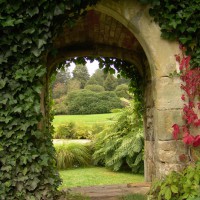

The Lord’s Prayer
Our first posting is from Rob Des Cotes. I have been privileged to be at one of Rob’s wonderful weekend retreats. Rob is a spiritual director, retreat leader and pastor of Fairview Baptist Church in Vancouver, B.C. He also directs Imago Dei, a network of faith communities that encourages the practice of prayer and a transforming relationship with God. He is the author of three books of meditations for spiritual direction, Fan the Flame, Higher Than I and Ultreia! (Go Higher). This posting was written for a whole week, beginning on a Monday. You will have four days to go through this, starting today, Sunday, in order to have a taste of ‘Lectio Devina’ using the Lord’s Prayer.
New Years blessings to each one of you!
Praying the Lord’s Prayer
Lord, teach us to pray. Luke 11:1
The Lord responded to this request by teaching His disciples what we now call “the Lord’s Prayer.” Ever since, these words have become the central utterance of the historical church. They are words that we are meant to embody as our first concerns of life. It is a beautiful prayer to recite, but it is in living each of these petitions that the power of these words becomes rooted in our thoughts, attitudes, actions and desires. Through these words we line up our desires with those of our Lord.
I have longed to shape my life according to this prayer and have been helped by a simple format that might serve you as well. Whenever I have tried to meditate on the various petitions during a single prayer time I have always found it overwhelming. Each verse is a lectio divina of its own. But the Lord’s Prayer can easily be walked through on a weekly basis, focusing on one meditation each day. A relationship with the Lord’s Prayer over the course of a week could look like this:
Monday: “Our Father who art in heaven, hallowed be thy name”
- consider today the many ways God nurtures us
- consider how the word our presumes a relationship with God that is a shared one
- meditate on the fact that, though God is with us and within us, He is also high above us. He is both immanent and transcendent
- consider your relationship to a God whose name is hallowed, holy
Tuesday: “Thy kingdom come, thy will be done on earth as it is in heaven”
- meditate on the need for change in the world
- consider the difference it will make and desire the day when every person will know the Lord for themselves. (Jer. 31:34)
- rejoice at the hope of everything being as it should; imagine the unity of agreement between heaven and earth, and among all people
Wednesday: “Give us this day our daily bread”
- it is half way through the week; pray for the conditions of your home or work place
- meditate on your circumstances, whether in need or in plenty, and consider all to be from God’s hand
- give thanks to God for the needs you do have; see yourself among those who are blessed because you hunger God-ward.
Thursday: “Forgive us our trespasses”
- the week now turns towards Sunday when you will once again meet the Lord in communion; it is time to “prepare the way of the Lord”
- spend time today taking stock of your life; confess all that represents a trespass of God’s loving desire for your life
- consider the ways your life has either intentionally or inadvertently worked against God’s purposes in you, and in your relationship with others
- be grateful for the confidence you have in asking for forgiveness; and for the assurance you have that you will receive it
Friday: “as we forgive those who trespass against us”
- Friday, in many Christian traditions, is considered a day of mercy since it was the day the Lord gave His life for us. As we have freely received mercy when we asked for it yesterday, today we consider all those who offend us as we pray for the faith to forgive them
- as Christ does for you, present others to yourself as “spotless, without blemish” (Eph. 5:27)
- forgive yourself also, for all the ways you think you fail in your own eyes
Saturday: “And lead us not into temptation but deliver us from evil”
- Saturday, in most Christian traditions, is seen as a day of waiting, as it lies between Good Friday and Resurrection Sunday
- in the days preceding, you have asked for and have received forgiveness. Jesus now says to us, “go and sin no more.” Today is a day when you strive to remain in His love, clean because of the grace you have received from His hand
- let us not underestimate the daily help we need in order to continually walk in righteousness
Sunday: “For thine is the Kingdom, the power and the glory forever and ever, Amen.”
- the Lord’s Day is a day of victory that affirms God’s rule over sin and death
- we meditate on eternity, when God’s glory will no longer be seen dimly, but will be fully recognized by all
- rest in the confidence that God’s sovereign power will achieve all that He has promised.
40 Days of Contemplative Ways
BEGINNING ON JANUARY 1ST, or any day you choose
You have reached the home of the blog entitled, 40 Days of Contemplative Ways! I am excited to have more then 10 guest blog posters who are willing to share their experiences of contemplative ways that they enjoy in their personal lives. You can interact with them, responding to what they have experienced, or comment on how it is for you as you newly explore a practice they have shared. You may even find yourself encouraged to begin an old favourite practice once again! I am honoured that you will be taking the time to join in our mutual adventure – it is an inspiring way to begin the new year.
Contemplative living seems to flow against our way of life today. It takes a commitment to go against the grain. This blog hopes to support your commitment to begin the year 2012 with a taste of contemplative ways. So what do we mean by contemplative ways? Our guest blog posters are going to be the ultimate demonstrators of what contemplative ways are, but I will begin here with a simplified explanation. Contemplative ways invite us to a deeper way of living, beyond the surface of our busyness, our competitive edge, the noise, and the electronic tyranny of our age. It is an invitation to come away into a deep attentiveness to the ways in which the creative presence of God makes itself known within ourselves and our lives. It is a way to create space for the recognition and relationship of God in our lives and make room for the possibility of gratitude and of transformation. It is about looking within, as we listen with our hearts, to a part of our beings that may have become a stranger to us. It is about cultivating and having compassion for community, to both give of our gifts and receive from others. It is about noticing and caring about nature and facilitating its flourishing. It is about recognizing, caring and living the gift of our work in a meaningful way. It is about attending to the rhythms and seasons of our lives, leaving space for rest and renewal.
There is no single way to engage in contemplative practices. Your uniqueness will determine what your favourite practice may become. In my studies in spiritual direction, we applied this ‘observation, consideration, or gazing attentively’ (a definition of the latin word contemplari) in such a variety of ways. These included sitting, standing, walking, and lying down; using attitudes of not doing; deep listening (from the heart), pondering, and questioning; guided imagery and active imagination, along with exercises using the body and artistic expression.
We invite you to share these contemplative ways with us. It may be helpful to journal this 40 day journey as you experience what our blog posters have come to know for themselves. As you interact with the material, may you transition towards what Soulstream has suggested; moving from studying to savouring, from explaining to experiencing, from probing to being probed, from mastering to being transformed. May you be wonderfully blessed by the experience!
Here is the Royal Roll of the blog posters who are participating. They are listed in alphabetical order. More information about who they are will be given as each of their posts are published:
-
Brent Unrau
-
Christopher Chiu
-
Christine Valters Paintner
-
Donelda Seymour
-
Gwen Neufeld
-
Lorie Martin
-
Murray Dueck
-
Paul Jones
-
Pearl Nieuwenhuis
-
Rob De Cotes
And more…
Fill in the form below to receive more ideas or encouragement via Email. |
[easy_sign_up] |
Spiritual Life

“To live a spiritual life we must first find the courage to enter into the desert of our loneliness and to change it by gentle and persistent efforts into a garden of solitude. The movement from loneliness to solitude, however, is the beginning of any spiritual life because it is the movement from the restless senses to the restful spirit, from the outward-reaching cravings to the inward-reaching search, from the fearful clinging to the fearless play.” (From Reaching Out)
Supreme Gift

The supreme gift that anyone can give another is to help that person live life more aware of the presence of God. Sacred companions help us remember this is our Father’s world. They help us hear His voice, be aware of His presence and see his footprints as we walk through life. They accompany us on a journey that is made sacred not by their presence but by the presence of God. In doing so, they make the journey sacred. In doing so, they help us live with a keener awareness of the sacred. (p.17-18, David Benner, Sacred Companions).
Winged Seeds

“Every moment and every event of every man’s life on earth plants something in his soul. For just as the wind carries thousands of winged seeds, so each moment brings with it germs of spiritual vitality that come to rest imperceptibly in the minds and wills of men.” (Thomas Merton)







